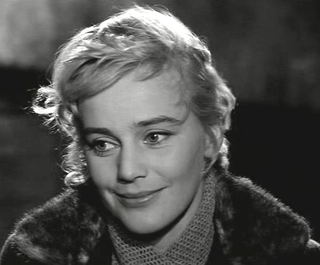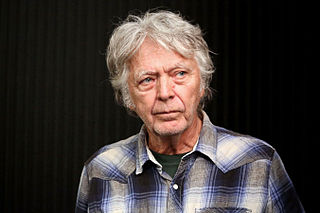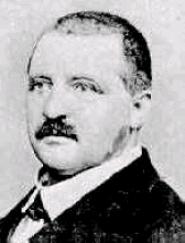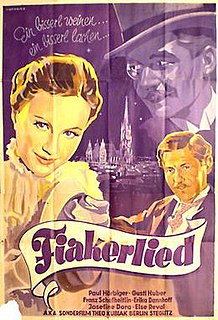Related Research Articles

Vienna is the national capital, largest city, and one of nine states of Austria. Vienna is Austria's most populous city, with about 1.9 million inhabitants, and its cultural, economic, and political center. It is the 6th-largest city by population within city limits in the European Union.

William Olaf Stapledon – known as Olaf Stapledon – was a British philosopher and author of science fiction. In 2014, he was inducted into the Science Fiction and Fantasy Hall of Fame.

The Austrian Green Party is a green political party in Austria.

Maria Margarethe Anna Schell was an Austrian-Swiss actress. She ranged among the stars of German cinema in the 1950s and 1960s. In 1954, she was awarded the Cannes Best Actress Award for her performance in Helmut Käutner's war drama The Last Bridge, and in 1956, she won the Volpi Cup for Best Actress at the Venice Film Festival for Gervaise.

James Benning is an independent filmmaker from Milwaukee, Wisconsin. Over the course of his 40-year career Benning has made over twenty-five feature-length films that have shown in many different venues across the world.

A schnitzel is a thin slice of meat fried in fat. The meat is usually thinned by pounding with a meat tenderizer. Most commonly, the meats are breaded before frying. The breaded schnitzel is popular in many countries and is made using veal, pork, chicken, mutton, beef, or turkey. A vegetarian alternative is to make schnitzel using cheese or textured vegetable protein. Schnitzel is very similar to the dish escalope in France, tonkatsu in Japan, and the milanesa of Italy, Mexico, Uruguay, Paraguay, Argentina, Brazil and chicken fried steak of the Southern United States.
Amos Vogel was a New York City cineaste and curator.

Anton Bruckner's Symphony No. 1 in C minor, WAB 101, was the first symphony the composer thought worthy of performing, and bequeathing to the Austrian National Library. Chronologically it comes after the Study Symphony in F minor and before the "nullified" Symphony in D minor. The composer gave it the nickname "Das kecke Beserl", or "The Saucy Maid", and conducted its 1868 premiere. Much later, after Bruckner was granted an honorary University of Vienna doctorate in 1891, he dedicated the 1890 version of the work to that institution.

Carl Julius Rudolf Moll was a prominent art nouveau painter active in Vienna at the start of the 20th century. He was one of the artists of the Vienna Secession who took inspiration from the pointillist techniques of French Impressionists.

Christoph Waltz is an Austrian-German actor and director. Since 2009 he has mainly been active in the United States. His accolades include two Academy Awards, two Golden Globe Awards, two British Academy Film Awards and two Screen Actors Guild Awards.

Cinema of Austria refers to the film industry based in Austria. Austria has had an active cinema industry since the early 20th century when it was the Austro-Hungarian Empire, and that has continued to the present day. Producer Sascha Kolowrat-Krakowsky, producer-director-writer Luise Kolm and the Austro-Hungarian directors Michael Curtiz and Alexander Korda were among the pioneers of early Austrian cinema. Several Austrian directors pursued careers in Weimar Germany and later in the United States, among them Fritz Lang, G. W. Pabst, Josef von Sternberg, Billy Wilder, Fred Zinnemann, and Otto Preminger.

Yann Sommer is a Swiss professional footballer who plays as a goalkeeper for Borussia Mönchengladbach and the Swiss national team.
The Case of Lena Smith is a 1929 American silent drama film directed by Josef von Sternberg, starring Esther Ralston and James Hall, and released by Paramount Pictures.

Romuald Karmakar is a French film director, screenwriter and producer. He was born in Wiesbaden, Germany as the son of a Bengali father and a French mother. From 1977 to 1982 he lived in Athens. He has won several national and international awards, including the German National Film Award in Gold in 1996 for Der Totmacher (Deathmaker). His work has been honored with several retrospectives at festivals and cinematheques. In 2008, the MoMA celebrated his film Das Himmler-Projekt as one of the top 250 most important artistic acquisitions of the Museum since 1980. A member of Akademie der Künste, Berlin, Karmakar is internationally regarded for his honest representation of the less attractive aspects of society by focusing on those perpetrators responsible for these downfalls. Karmakar is currently a Fellow at the Radcliffe Institute for Advanced Study at Harvard University (2012–13). He has been invited as one of the four artists to represent Germany at the German Pavilion at the Art Venice Biennale in 2013.

Wiener schnitzel, sometimes spelled Wienerschnitzel, as in Switzerland, is a type of schnitzel made of a thin, breaded, pan-fried veal cutlet.

Dominik Graf is a German film director. He studied film direction at University of Television and Film Munich, from where he graduated in 1975. After a few films in the tradition of the German 'Autorenfilm', he turned towards work in television, focussing primarily on the genres police drama, thriller and crime mystery. He is an active participant in public discourse about the values of genre film in Germany, through numerous articles, and interviews, some of which have been collected into a book.
The Robert Award for Best Foreign Film was an award presented by the Danish Film Academy at the annual Robert Awards ceremony between 1984 and 1996, bar 1988 and 1989.

The Cabbie's Song is a 1936 German romantic drama film directed by E. W. Emo and starring Paul Hörbiger, Gusti Huber, and Franz Schafheitlin. The film offers a nostalgic view of Vienna during the old Imperial Era. It takes its name from a popular Viennese song, and its set in the 1880s at the time of the song's composition.
Johann Christoph von Paar was the Regional postmaster for Inner Austria, a post he appears to have inherited from his father. The principal route operated from Vienna via Graz to Venice and it was in Graz that von Paar held the office, under the Archduke Ferdinand who later became the Emperor, Ferdinand II.
Fred Liewehr (1909–1993) was an Austrian stage and film actor.
References
- ↑ Cinema Scope: The Modest Pilgrim by Olaf Moller
- ↑ Foreign Correspondence by Christoph Huber
- ↑ Foreign Correspondence by Christoph Huber
- ↑ Foreign Correspondence by Christoph Huber
- ↑ Edition Filmmuseum Shop - Langsamer Sommer & Schwitzkasten